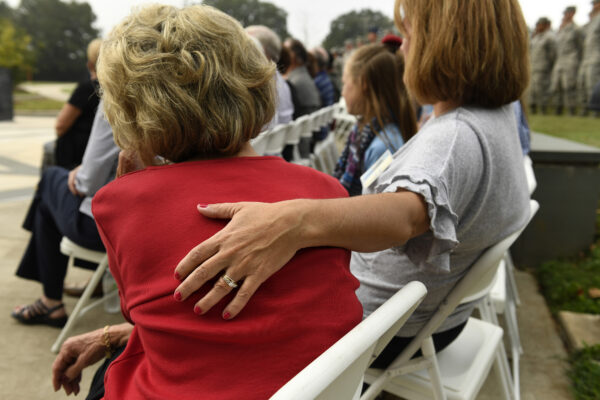
(Photo: Tech. Sgt. Julianne Showalter)
When a Veteran passes away, certain VA benefits may be available to their eligible family members. These benefits depend on factors such as the Veteran’s service record, disability status, and other criteria.
Benefits for Children and Dependents of Veterans
Here are some common VA benefits that may pass on to family members.
Dependency and Indemnity Compensation
Dependency and Indemnity Compensation, or D.I.C., is a monthly, tax-free benefit for eligible survivors of certain deceased Veterans. It is available to surviving spouses, children, and dependent parents of Service Members who died in the line of duty, Veterans whose death resulted from a service-related injury or disease, or Veterans who were totally disabled due to service-connected conditions for a specified period before passing away.
Healthcare Benefits
Family members of deceased Veterans may qualify for healthcare benefits through the VA. One such option is the Civilian Health and Medical Program of the Department of Veterans Affairs, CHAMPVA, which provides coverage for spouses and dependent children of Veterans with permanent and total service-connected disabilities. This program ensures access to necessary medical care and services.
Survivors Pension
The Survivors Pension is designed for low-income, non-remarried surviving spouses and unmarried children of deceased wartime Veterans. Eligibility is based on income and net worth limitations, as well as certain service-related conditions of the deceased Veteran. This benefit provides financial support to help meet the living expenses of eligible family members.
Home Loan Guarantee
Surviving spouses of certain deceased Veterans may be eligible for VA home loan guarantee benefits. This program allows the surviving spouse to obtain a VA-guaranteed home loan with favorable terms. These guarantees can make it easier to secure a loan, purchase a home, or refinance an existing mortgage under better conditions.
Education Benefits
The VA provides education benefits to surviving spouses and children of certain deceased Veterans through the Survivors’ and Dependents’ Educational Assistance, DEA, program. This program offers educational and training opportunities, including tuition assistance, to eligible dependents of Veterans who are permanently and totally disabled due to service-connected conditions, died while on active duty, or as a result of a service-connected disability.
Burial Benefits
The VA offers burial benefits for eligible Veterans, including interment in a VA National Cemetery, a headstone or marker, a burial flag, and a Presidential Memorial Certificate. Eligible family members may also receive certain burial benefits, such as reimbursement for burial expenses or assistance with the transportation of the deceased Veteran’s remains.
To learn more about these benefits and other related programs, visit the VA’s official website or contact a VA representative.













a lot of discussion in these articles about when people are dead/ we need to think about the living and how we can support them. a good example is the cost of living, food prices, gas etc. everyone wonders why people are leaving Ca. They cannot afford to live here any more. There should be a state or federal law where 100% disabled veterans should be exempt from state taxes, Right now the majority of his benefits are for his wife and children. He should benefit while he is still alive.